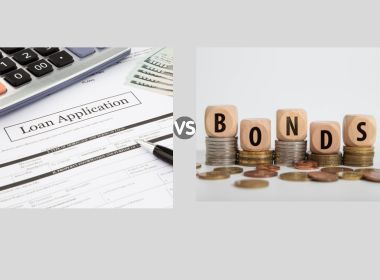Search Suggestions
- Gold Loan
- Money Transfer
- Mutual Funds

Fixed vs. Variable Interest Rates in Personal Loans: Choosing Wisely
When considering a personal loan, one of the most important decisions you'll need to make is whether to opt for a fixed or variable interest rate. Each option has its advantages and disadvantages, so understanding them is essential before making a choice.
Table of Content
- What is a Fixed Interest Rate?
- Benefits of Fixed Rate Personal Loans
- What is the Variable Interest Rate?
- Benefits of Variable Rate Personal Loans
- Which Type of Loan Rate Should I Choose?
- Final Words
Securing the best interest rate for your loan is crucial, as it significantly impacts the overall cost of borrowing. Lower interest rates lead to lower monthly payments and potentially less interest paid over the life of the loan, saving you money and making the loan more affordable. Let’s explore fixed and variable-rate personal loans in more detail.
What is a Fixed Interest Rate?
As the name suggests, a fixed interest rate remains constant throughout the loan term and is not affected by fluctuations in the economy's interest rates. When determining the interest rate, banks consider the borrower's creditworthiness, their borrowing costs (primarily interest paid to depositors), and other operational expenses. The Reserve Bank of India's repo rate, which influences all other interest rates across financial products, also affects loan pricing by banks. However, with a fixed-rate personal loan, changes in the repo rate do not impact the loan’s interest rate.
Benefits of Fixed Rate Personal Loans
Predictability
The unchanging EMI throughout the loan tenure allows for easier financial planning. Borrowers can reliably allocate a portion of their monthly income for loan repayment.
Budget Flexibility
With a set EMI amount, borrowers can more confidently plan their household budget. This includes both essential expenses and discretionary spending like dining out or short trips.
Interest Rate Stability
Fixed-rate loans provide some insulation against potential future interest rate increases. Even if market rates rise due to economic changes, borrowers continue to pay the same EMI amount.
What is the Variable Interest Rate?
Also known as floating rate personal loans are tied to various benchmarks, either external, such as the RBI repo rate, or a combination of lenders' borrowing and operational costs. The final interest rate is determined by adding a spread over the benchmark, which depends on the borrower's credit history.
Since these benchmarks are subject to periodic resets, the EMI on variable or floating-rate loans can change. Some retail loans are priced based on external benchmarks like the RBI repo rate. However, lenders will decide whether to adjust the spread based on the borrower's profile.
Benefits of Variable Rate Personal Loans
Market-Based Pricing
In variable-rate personal loans, the pricing is based on the current interest rate prevailing in the market.
Variable-rate personal loans are priced according to current market interest rates.
Potential Savings from Rate Reductions
If the RBI lowers the repo rate, borrowers may benefit from reduced interest rates. This could result in lower EMIs, potentially falling below the budgeted amount. Any savings from lower EMIs could be used for loan repayment if desired.
Prepayment Flexibility
Borrowers can reduce their debt by prepaying their loans, either in full or partially, before the loan tenure ends. While lenders typically charge prepayment penalties, the RBI has prohibited such charges for floating-rate personal loans.
Suggested Read: Difference Between Fixed & Floating Interest Rate For Loan
Which Type of Loan Rate Should I Choose?
Wondering which interest rate is better for long term financial planning? Ultimately, choosing between a fixed and variable interest rate depends on your circumstances and risk tolerance. If you value stability and predictability, a fixed interest rate will likely provide comfort. However, if you're open to some uncertainty in exchange for potentially lower initial rates, a variable-rate personal loan might be more appealing.
When considering a variable interest rate, it's crucial to carefully review the loan's terms and conditions. Understand how frequently the rate can change, the factors influencing rate adjustments, and any caps or limits on rate increases. This will help you make an informed decision and ensure you are comfortable with potential changes in your monthly payments.
Final Words
Remember, whether you opt for a fixed or variable rate, it's important to compare offers from different lenders and consider your creditworthiness. This will help you find the best possible interest rate for your loan and ensure it fits your financial goals and capabilities. At Muthoot Finance, get comprehensive information on personal loan eligibility, including interest rates, available amounts, and repayment tenures. Applying for a personal loan with Muthoot Finance is straightforward and can be done entirely online.
CATEGORIES
OUR SERVICES
-

Credit Score
-

Gold Loan
-

Personal Loan
-

Cibil Score
-

Vehicle Loan
-

Small Business Loan
-

Money Transfer
-

Insurance
-

Mutual Funds
-

SME Loan
-

Corporate Loan
-

NCD
-

PAN Card
-

NPS
-

Custom Offers
-

Digital & Cashless
-

Milligram Rewards
-

Bank Mapping
-

Housing Finance
-

#Big Business Loan
-

#Gold Loan Mela
-

#Kholiye Khushiyon Ki Tijori
-

#Gold Loan At Home
-

#Sunherisoch
RECENT POSTS

What is a Digital Wallet: Meaning, Types, Examples & Benefits
Know More
What is Refinancing: Meaning, Types, Benefits & Examples
Know More
What Is a Debt Trap? Meaning, Causes & How to Avoid It
Know More
Gold Price Forecast 2026: Will Gold Prices Rise or Fall?
Know More
What Is Capital Gains Tax in India? Meaning, Types & Tax Rates
Know More
Best Index Funds to Invest in India in 2026
Know More
Understanding Gold Bees: How it Works, Net Asset Value, Returns and More
Know More
Multi Cap and Flexi Cap Mutual Funds: How Are They Different?
Know More
Online Personal Loan vs. Offline Personal Loan - Which Is Better for You?
Know More
10 Tips to Improve Chances of Personal Loan Approval
Know MoreFIN SHORTS

What Is a Gold Loan and Who Should Consider It?
Know More
How Does a Gold Loan Work? A Simple Step-by-Step Guide
Know More
How to Link Your Mobile Number with PAN Card Step-by-Step Guide
Know More
Is a PAN Card Mandatory for a Gold Loan? Rules Explained
Know More
Can You Have Multiple Personal Loans at the Same Time?
Know More
Why Is Gold Sustaining Near ₹1.5 Lakh? Key Reasons Explained
Know More
The Best 7 SIF Funds of 2026: A Better Way to Invest
Know More
Gold Price Hits ₹1,40,000: How It Impacts Gold Loan Amounts
Know More
How to Check Loan Number: Step-by-Step Process
Know More
How to Open an SIP Account: Online and Offline Process
Know More
How Do I Apply for MSME Certification Online in India?
Know More
7 Important Reasons to Choose Hallmark Gold When Buying Jewellery
Know More- South +91 99469 01212
- North 1800 313 1212





